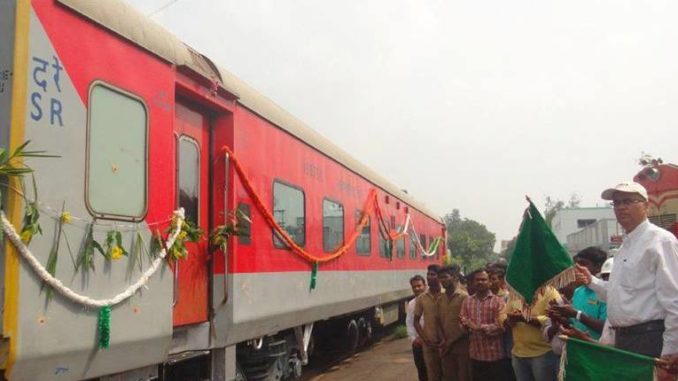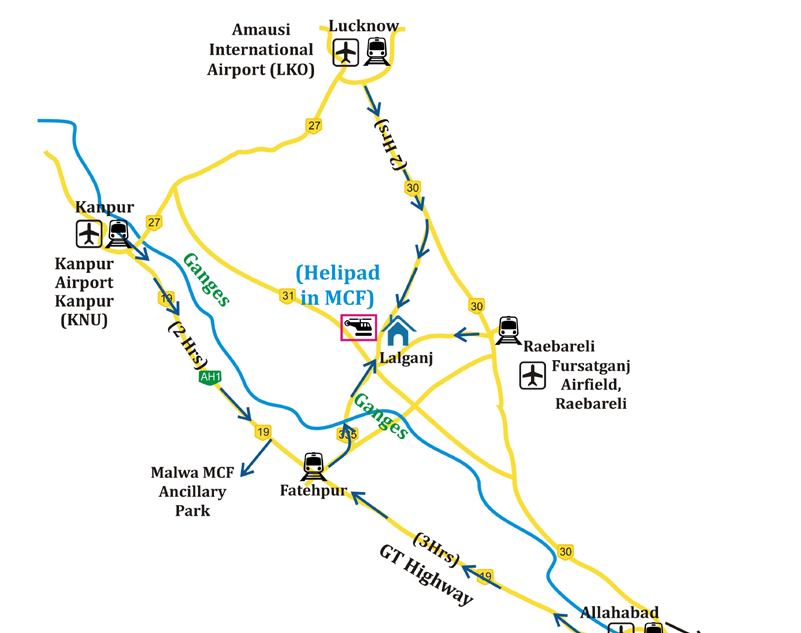
Almost every one of us has travelled via railways at least once in a lifetime. But have you ever wondered where and how the trains and their coaches are manufactured?
The Indian railways have been accumulating the manufacturing capacity from its three factories- Integral Coach Factory, Chennai (Tamil Nadu), Rail Coach Factory, Kapurthala (Punjab) and the New Factory: Modern Coach Factory, Rae Bareli (Uttar Pradesh).
The first coaches manufacturing factory (Integral Coach Factory, Chennai) and second manufacturing unit (Rail Coach Factory, Kapurthala) were established in 1952 and 1986 respectively. The two manufacturing units were not sufficient to cater to the requirements of Indian Railways’ coaches across India; Thus, Indian Railways decided to set up the third railway passenger coaches manufacturing unit in Lalganj, district Rae Bareli in Uttar Pradesh. Modern Coach Factory in Rae Bareli, Uttar Pradesh. This was initiated in 2007; however, the construction work was started in 2009.

The rail coach factory had witnessed numerous complications. Social and political glitches have been one of the foremost reasons for the rail coach factory unit to observe multiple inaugurations. Modern Coach Factory, Raebareli, formerly known as Rail Coach Factory, was inaugurated on 7 November 2012.
It was in December 2015, that the railway passenger coaches manufacturing unit was coined the name “ Modern Coach Factory ”. MCF is situated nearly 3 km away from Lalganj, on Kanpur-Raebareli road (85 km from Lucknow).
Modern Technologies for Manufacturing of Coaches:
Indian railways have always been the lifeline of transportation in India, and it is also one of the ancient establishments that employs a large number of people. Indian Railways from its elementary days have been importing the technology to manufacture coaches. For instance, Indian railways tied up with an European Company for transfer of technology to manufacture steel-bodied passenger coaches and thus the Integral Coach factory was established at Perambur, Chennai.
Integral design coaches were initially imported from Europe and later were produced in India at Integral Coach Factory, Perambur in Madras (Chennai). These integral coaches had the underframe and the body welded together and was light in weight. Helical coil springs and roller bearing axles with hydraulic dash pots and rubber pads were new introductions which improved the ride quality.

The requirement for the new technology state of art coach led the procurement of Alstom LHB of Germany in 2000 and the production of these coaches is on the rise due to its demand. Both the ICF coaches and the LHB coaches are rendering reliable service to the nation and have many safety features incorporated.
Indian Railways entered into the contract with Linke Hofmann Busch (LHB) Germany in the late ‟90s and purchased 24 broad gauge AC Chair Car coaches. Rail Coach Factory (RCF) started manufacturing these LHB coaches from 2001 and the first indigenous LHB coach was rolled out in Dec 2002.
Now, All Units of Indian Railways are manufacturing these LHB coaches.
In the recent years, post inauguration, MCF has almost doubled its production year by year, starting from 140 coaches in 2014-15, to 285 coaches in 2015-16, then 576 coaches in 2016-17 and first time achieving the given production target of 710 coaches by manufacturing 711 coaches in 2017-18.

Against a planned annual capacity of 1000 coaches, till February 2019, MCF has turned out 1283 coaches in 2018-19.
Besides manufacturing stainless steel LHB coaches, as the name suggests, MCF is taking up new challenges of manufacturing modern day coach design, including train sets, metro coaches, aluminium body coaches, bullet train coaches and high-speed coaches to meet upcoming demands.
Impact on the city
The city that was once quiet and underdeveloped became one of the industrial hubs of India with lots of hustle and bustle everywhere; as Raebareli started witnessing the manufacturing with raw materials, machinery, people travelling from far off places, technology and similar things making way to their city, every now and then.

The factory was constructed by the IRCON International Limited & it adheres to stringent pollution control norms for curbing air pollution and spillage of oils and employs fume and sewage neutralization systems.
MCF will become the first Rail factory to meet Zero-Energy Mega Factory standards by 2020-21.
Employment opportunities for people of the city
With the commencement of Modern Coach Factory, the recruitments in skilled manpower was required in its every department; which was next to null and void at the moment .
Initially, 1450 jobs were rolled out to the families that were affected by the land acquisition, besides the compensation package . Further, the Lucknow Division of the Northern Railways also filled their 1000 job vacancies, resulting in the factory to begin on a great note.

The workmanship required by the MCF made the employment opportunities to grow at the speed of light. MCF has boosted the local economy of Raebareli. It has created employment opportunities for local youth and invigorated industries in the vicinity. Goods worth Rs 667 crore were procured from MSMEs in 2018-19. Purchase from local units in Raebareli was less than Rs 1 crore in 2013-14 which has now become Rs. 124 cr in 2018-19.
Further, training centres have been developed to provide skill development opportunities to local youth.

